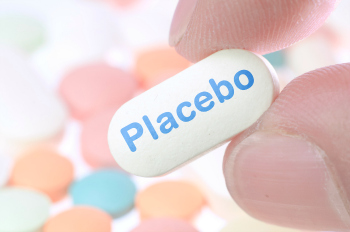For Women, Placebo Effect Might Explain Improvement in Sexual Function

Treatments for female sexual dysfunction are “minimally superior to placebo,” according to new research in the journal Obstetrics and Gynecology.
Researchers reached this conclusion after analyzing eight medical studies on treatments for women’s sexual difficulties, including hypoactive sexual desire disorder (HSDD) and problems with arousal, sexual pain, and orgasm.
Flibanserin, ospemifene, and intravaginal prasterone were some of the treatments used.
The analysis was sparked by previous research showing a “marked” placebo effect in clinical trials of treatments for women’s sexual dysfunction.
What is a placebo effect?
When researchers test new medications or therapies, a placebo group is a key component of the study. Some of the study participants take the drug or undergo the therapy. But the rest take a placebo, such as sugar pill, instead of the tested treatment. Participants don’t know whether they are in the treatment group or the placebo group. In this way, researchers can get a better idea of whether outcomes (such as side effects or improvement of symptoms) are likely to be from the drug or from other factors.
Sometimes, people in placebo groups respond in a similar way as those in the treatment group. This is called aplacebo effect. For example, let’s imagine that Maria and Laura are taking part in a trial for a pain medication. Maria takes the drug and feels better. Laura takes the drug and feels better, too. Does that mean the drug has no effect? Not necessarily.
The force behind placebo effect is difficult to explain, but some experts think a patient’s expectations are involved. Laura, knowing that she is participating a study of pain medication, might see improvements because she expects to.
The analysis
Overall, 2,236 study participants received treatment for a sexual problem, and 1,723 received a placebo. In all the studies, the women completed the Female Sexual Function Index (FSFI), a questionnaire designed to assess female sexual dysfunction. Higher scores on the FSFI correspond with better sexual functioning.
The women who received treatment saw their scores increase 5.35 points, which showed improvement. But the women in the placebo groups also had some improvement, with a score increase of 3.62 points.
After examining the data further, the study authors determined that for about two-thirds of the women, results might be explained by a placebo effect.
“Our findings suggest that the current treatments for female sexual dysfunction are, overall, minimally superior to placebo, which emphasizes the ongoing need for more efficacious treatment for female sexual dysfunction,” the authors wrote.
Resources
Contemporary OB/GYN
Nierengarten, Mary Beth
“What’s wrong with therapies for female sexual dysfunction?”
(August 9, 2018)
http://www.contemporaryobgyn.net/dyspareunia/whats-wrong-therapies-female-sexual-dysfunction
Obstetrics and Gynecology
Weinberger, James M. BS, et al.
“Female Sexual Dysfunction and the Placebo Effect: A Meta-analysis”
(Abstract. August 2018)
https://journals.lww.com/greenjournal/Citation/2018/08000/Female_Sexual_Dysfunction_and_the_Placebo_Effect_.24.aspx
WebMD
“What is the Placebo Effect?”
(Reviewed: February 28, 2018)
https://www.webmd.com/pain-management/what-is-the-placebo-effect#1
You may also be interested in...
Other Popular Articles

What Is the Average Penis Size?
If you have ever wondered how your penis compares to others in terms of size, you are not alone. Many men are curious to know how their penises stack up compared to the average. Unfortunately, general curiosity can sometimes give way to full-on obsession and anxiety about penis size. This can be an unhealthy and often unnecessary fixation, especially because most men who think their penises are too small have perfectly normal-sized penises.

What Is Jelqing, and Does It Actually Work?
The term “jelqing” refers to a set of penis stretching exercises that some believe can make the penis bigger. Although the practice has gained attention and popularity in blogs and internet forums in recent years, there is no scientific evidence that it is an effective way to permanently increase the size of one’s penis. In fact, in some cases, jelqing may actually cause damage to the penis, so it is a good idea to get all the facts before setting off to try it.

What Is Sensate Focus and How Does It Work?
Sensate focus is a technique used to improve intimacy and communication between partners around sex, reduce sexual performance anxiety, and shift away from ingrained, goal-oriented sexual patterns that may not be serving a couple.

Can Sex Reduce Menstrual Cramps?
The SMSNA periodically receives and publishes ‘guest editorials.’ The current article was submitted by Mia Barnes, a freelance writer and researcher who specializes in women's health, wellness, and healthy living. She is the Founder and Editor-in-Chief of Body+Mind Magazine.
Having sex while you experience menstrual cramps is healthy and can provide significant benefits. While it might not be the first activity that comes to mind when your PMS or period cramping begins, many people enjoy sex to reduce menstrual cramps, experience increased pleasure and benefit from other advantages. Learn more about having sex while menstrual cramps are happening and how it can help your body.

How Long Does It Take the Average Man to Ejaculate?
On average, it takes a man between 5 to 7 minutes to orgasm and ejaculate during sexual intercourse.

The Effect of Regular Aerobic Exercise on Erectile Function
Erectile dysfunction (ED) is the inability to achieve or maintain an erection sufficient for satisfactory sexual activity. As men get older, their erectile functioning may naturally decline due to changes in testosterone levels, cardiovascular functioning, and the potential development of other chronic medical conditions that become more common with age.
You are prohibited from using or uploading content you accessed through this website into external applications, bots, software, or websites, including those using artificial intelligence technologies and infrastructure, including deep learning, machine learning and large language models and generative AI.

